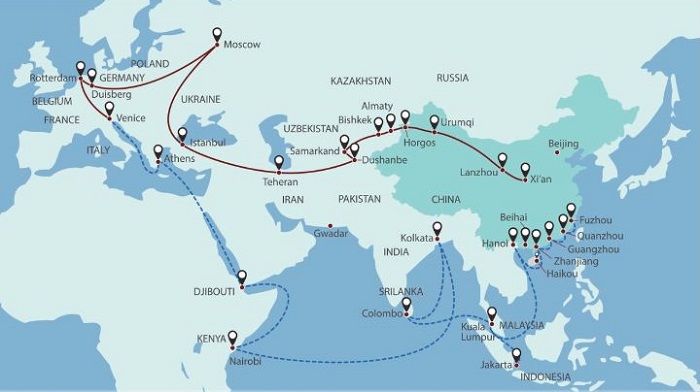
New research has found that not enough is being done by financiers of China’s Belt and Road Initiative to put in place safeguards to protect critical wildlife habitats.
The research carried out by the University of Queensland and University of Nottingham Malaysia found that few financiers funding the Belt and Road Initiative (BRI), a massive international infrastructure programme, require biodiversity safeguards. The research has just been published in Nature Sustainability.
BRI is China’s ambitious regional connectivity initiative encompassing thousands of transport, energy and industrial infrastructure projects being built along eight trans-national corridors spanning 70 countries in the Asian, European and African continents and their adjacent seas.
“The six terrestrial infrastructure corridors envisaged under BRI crisscross some of the most ecologically-fragile geographies in Southeast Asia, Central Asia and South Asia,” said Divya Narain, a PhD candidate at the UQ Centre for Biodiversity and Conservation Science who led the study. “We argue for best-practice mitigation measures to be put in place by BRI’s financiers as the initiative risks having an irreversible impact on global biodiversity”

"Our analysis finds that the road and rail routes of the initiative potentially affect 150,000 sq. km. of critical habitat. Financier safeguards can act as an important line of defense against construction-induced effects on biodiversity," said Dr Alex Lechner, Associate Professor at the School of Environmental and Geographical Sciences at the University of Nottingham, Malaysia Campus and Adjunct Fellow at UQ’s Sustainable Minerals Institute.
“We compiled a list of BRI’s financiers and scrutinized their policies for enforceable requirements to protect biodiversity,” explained Ms. Narain. “However, most financiers of BRI are yet to put in place binding biodiversity impact mitigation requirements. The considerable biodiversity impact of the infrastructure projects could remain unmitigated.”
“Safeguards of multi-lateral development banks (MDBs) offer international best practice that has evolved over decades,” noted Professor Martine Maron who co-authored the study. “International best-practice requires a ‘net gain’ of biodiversity in cases where there are impacts upon critical habitat. Strong safeguards such as this are especially important for projects that potentially damage large areas of essential biodiversity habitat.”
“Co-financing by MDBs offers the opportunity for transfer of best practice to financiers who lack biodiversity safeguards, through capacity building and technical assistance,” added Prof. Maron.
-ends-
For media enquiries please contact: Josephine Dionisappu, PR and Communications Manager University of Nottingham Malaysia at josephine.dionisappu@nottingham.edu.my
Notes to editors: The University of Nottingham is a research-intensive university with a proud heritage, consistently ranked among the world's top 100. Studying at the University of Nottingham is a life-changing experience and we pride ourselves on unlocking the potential of our 44,000 students - Nottingham was named both Sports and International University of the Year in the 2019 Times and Sunday Times Good University Guide, was awarded gold in the TEF 2017 and features in the top 20 of all three major UK rankings. We have a pioneering spirit, expressed in the vision of our founder Sir Jesse Boot, which has seen us lead the way in establishing campuses in China and Malaysia - part of a globally connected network of education, research and industrial engagement. We are ranked eighth for research power in the UK according to REF 2014. We have six beacons of research excellence helping to transform lives and change the world; we are also a major employer and industry partner - locally and globally.
Posted on 14th May 2020